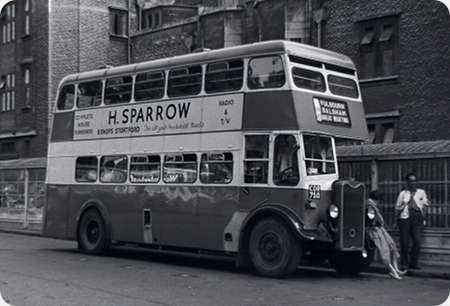Premier Travel – Guy Arab II – CDR 750 – 110
Premier Travel (Cambridge)
1944
Guy Arab II 5LW
Roe L27/28R
By 1957, Premier Travel of Cambridge was looking to replace the remainder of its rather tired ex LPTB STLs and the second hand utility CWA6s from Huddersfield, Glasgow and Mansfield. It turned to the rugged Gardner 5LW powered Guy Arab II, choosing seven ex Southdown highbridge examples with the well constructed Northern Counties UH30/26R bodywork, and these were supplemented by three lowbridge machines from Plymouth Corporation with rebuilt Roe UL27/28R bodies. Allocated the fleet numbers from 102 to 111 inclusive, these became the only Guy buses ever to enter the Premier fleet. The Guys proved to be very economical and reliable, but the Plymouth examples had severely governed engines that limited road performance, even in the relatively flat lands of their operating territory. Given its sparsely populated rural network, Premier ran very close to the breadline. Nonetheless, one wonders why the company did not simply get the fuel pumps recalibrated to the manufacturer’s standard setting, but this apparently never happened. The Guys lasted with Premier for some four to five years before being replaced by “White Lady” Leyland PD2s from Ribble. The picture shows the crew of No. 110, ex Plymouth Arab II CDR 750, taking a layover break in Cambridge Drummer Street Bus Station on 26 August 1959.
Photograph and Copy contributed by Roger Cox
31/05/16 – 09:35
The conductress appears to be taking the term "layover just a bit too literally!!
Chris Youhill
01/06/16 – 06:54
The Premier Travel company has a curious link with the present day state of the bus industry. In 1950, a certain John Alfred Blythe Hibbs, after working for the company in his second year as part of his degree studies at Birmingham (Woodbrooke) University, was appointed in 1950 as Personal Assistant to Arthur Lainson, the boss of Premier Travel. The precarious financial state of the company saw the departure of Hibbs in 1952, whereupon he became a ‘transport consultant’. In 1954 he completed a Masters degree thesis on the shortcomings (as he saw them) of the Road Service Licensing system. Then, in 1956, he and a partner bought Corona Coaches of Acton, near Sudbury, Suffolk, and then purchased the nearby business of A. J. Long of Glemsford in 1958. Almost exactly one year later, in August 1959, the entire business failed, and Hibbs once again became a consultant cum journalist until he found a job with British Railways in 1961 as Traffic Survey Officer, Eastern Region, at Liverpool Street. After several job reclassifications, he left BR in 1967 for the academic world where he thereafter remained, loudly proclaiming his views, until retirement. Thus, his entire practical knowledge of bus operation was gained with Premier Travel for two to three years, and then for a further three years with his disastrous Corona venture. This, then, was the "expert" whose "experience" saw him recruited by Ridley to give a cover of academic justification to the industry death knell called deregulation. You couldn’t make it up. Then, with the ‘success’ of deregulation behind him, Hibbs was then involved in the equally catastrophic privatisation of the railway system, yet another industry in which his experience was minimal. As George Bernard Shaw said, "Those who can, do; those who can’t, teach".
Roger Cox
01/06/16 – 09:13
Wonderful comments there Roger, and I fear that virtually everyone has now forgotten the scandalous Hereford and Worcester trial of 1985 – a handful of rural bus routes were allowed to be operated by "competent" small coach companies in order to prove that de-regulation would be in the interests of healthy competition and passenger benefit. Breaches of the embryo stern measures proposed were rife, but still the move went through and that’s where we are today !! A classic lesson in the need to stamp out a fresh virus before it it becomes a Nationwide uncontrollable epidemic.
Chris Youhill
01/06/16 – 17:24
My views on Ridiculous Nicolas have been aired here and elsewhere before. The man had one of the brownest noses of any of Thatcher’s sycophants and Roger’s comments come as no surprise. Having spent many years organising and operating conferences around the world for many disciplines in both academia and industry and having seen how the two interface, whenever an academic "expert" is asked to spout on television or in the press on how industry or the economy should deal with a problem, or should be run, unless I know they have years of practical experience alongside, or before, their being closeted in some think tank or hall of academe, I mentally switch off. Time after time these experts have been relied on to give their dubious weight to politicians’ hairbrained schemes, not just in the UK. The "reasoning" seems to be that the brightest brains are academics. That’s as maybe but translating theories into practice in established and sometimes in need of help industries needs real time, hands on, knowledge as well as hours sitting thinking and theorising.
Phil Blinkhorn
01/06/16 – 17:26
And back to the bus CDR 750 ended up next on a farm in Essex as a lorry and there was a article in a old Buses Annual and is now rebuilt back to a utility bus at the Scottish Vintage Bus Museum.
Ken Wragg
12/06/16 – 06:48
Something has been sticking in my mind…the company replaced its "preowned" utility Daimlers with some dependable and snouty Guys: and what did we get? proudly named "Premier", a presumably solvent and possibly affordable local bus service on a shoestring, as were a number of municipalities: no leased leviathans then with their dodgem transmissions and (often) miserable drivers… right, back to reality….
Joe
12/06/16 – 09:11
Blame ‘Economics’, Joe, manifest in the form of One Person Operation. Back then, a driver was just that, able to concentrate on the job, and a conductor spent the whole time with passengers. Realistically, in modern road conditions, something like the sedate 5LW Arab would struggle to keep time, though some of the present day bus timings are absurdly fast. Even so, the operating costs of modern buses are much higher than those of the Arabs, PD2s et al of the past, yet the reliability is far lower. Years ago, a bus ride was a pleasant experience. I don’t find that to be true today.
Roger Cox
Quick links to the - Comments Page - Contact Page - Home Page
Please leave a comment
Please Note if you want to send a photograph with your comment please use the Contact Page by clicking here or send as an attachment via email.

